⚡ TL;DR – Why Choose Flax Seed
- 🌿 Superfood energy — Packed with omega 3 fatty acids and lignans
- 💚 Heart health booster — Supports cardiovascular wellness
- 🏋️♂️ Weight management — High fiber keeps you full longer
- 🎗️ Cancer preventative — Rich in antioxidants that combat cancer
- 🔥 Anti-inflammatory hero — Soothes inflammation with omega-3s
💛 Why You Will Love Flax Seed
Boost Your Heart Health
Flax seed is a true heart hero. Its richness in omega 3 and lignans support cardiovascular health and help manage cholesterol levels.
Support Weight Management
The high fiber content in flax seeds helps keep you satiated, reducing the temptation to overeat and assisting your weight management journey.
Anti-Inflammatory Power
Rich in omega-3 fatty acids, flax seed helps combat inflammation, reducing the risk of diseases such as diabetes and heart disease.
✨ What’s So Special About It
Benefits
- ❤️ Heart Health — Omega 3 fatty acids contribute to maintaining a strong heart
- 🍏 Weight Loss — Satiates appetite and reduces overeating
- 🛡️ Cancer Prevention — Aids in defending against cancer
- 💪 Protein Power — Offers a valuable plant-based protein source
- 🔥 Inflammation Control — Fights inflammation naturally
Ingredients
- Flax Seed
- Natural Nutrients
- No additives
- No preservatives
What’s inside
Flax seed is renowned for its high omega-3 content, fiber, and lignans. These components support heart health, help regulate metabolism, and contribute to overall wellness.
🥗 Nutritional Profile
Per serving 2 tbsp
| Calories | 110 |
|---|
| Total Fat | 8.5 g |
|---|---|
| Sodium | 0 mg |
| Total Carbohydrate | 6 g |
| Total Sugars | 0 g |
| Protein | 4 g |
| Caffeine | 0 mg |
Trace amounts of vitamin C, vitamin A, folate, potassium, and magnesium may be present.
How it compares
Compared to other seeds, flax seed provides a superior source of omega 3 fatty acids and fiber, supporting heart and digestive health efficiently.
🍵 How to Use It
Preparation instructions
Combine 1 tsp of flax seed with any beverage, or consume with water. Make sure to accompany it with liquids to avoid bloating.
Serving ideas
- 🌅 Morning: Boost your oatmeal or yogurt with a flax seed sprinkle
- ⏸️ Midday: Add to your smoothie for a nutty twist
- 🌙 Evening: Bake into cookies or cakes for added nutrients
Storage and care
Store in a cool, dry place. Seal the package tightly after each use to preserve freshness.
⚠️ Cautions
- If you are pregnant, nursing, taking medication, or have a health condition, check with a professional.
- Discontinue use if sensitivity occurs.
- Intended as part of a balanced lifestyle.

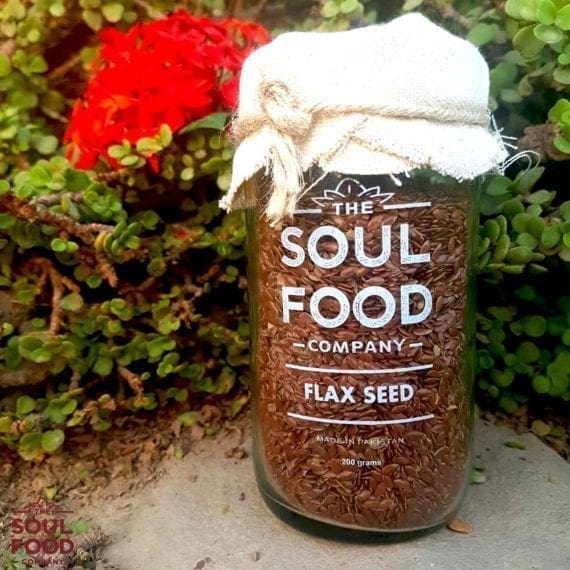
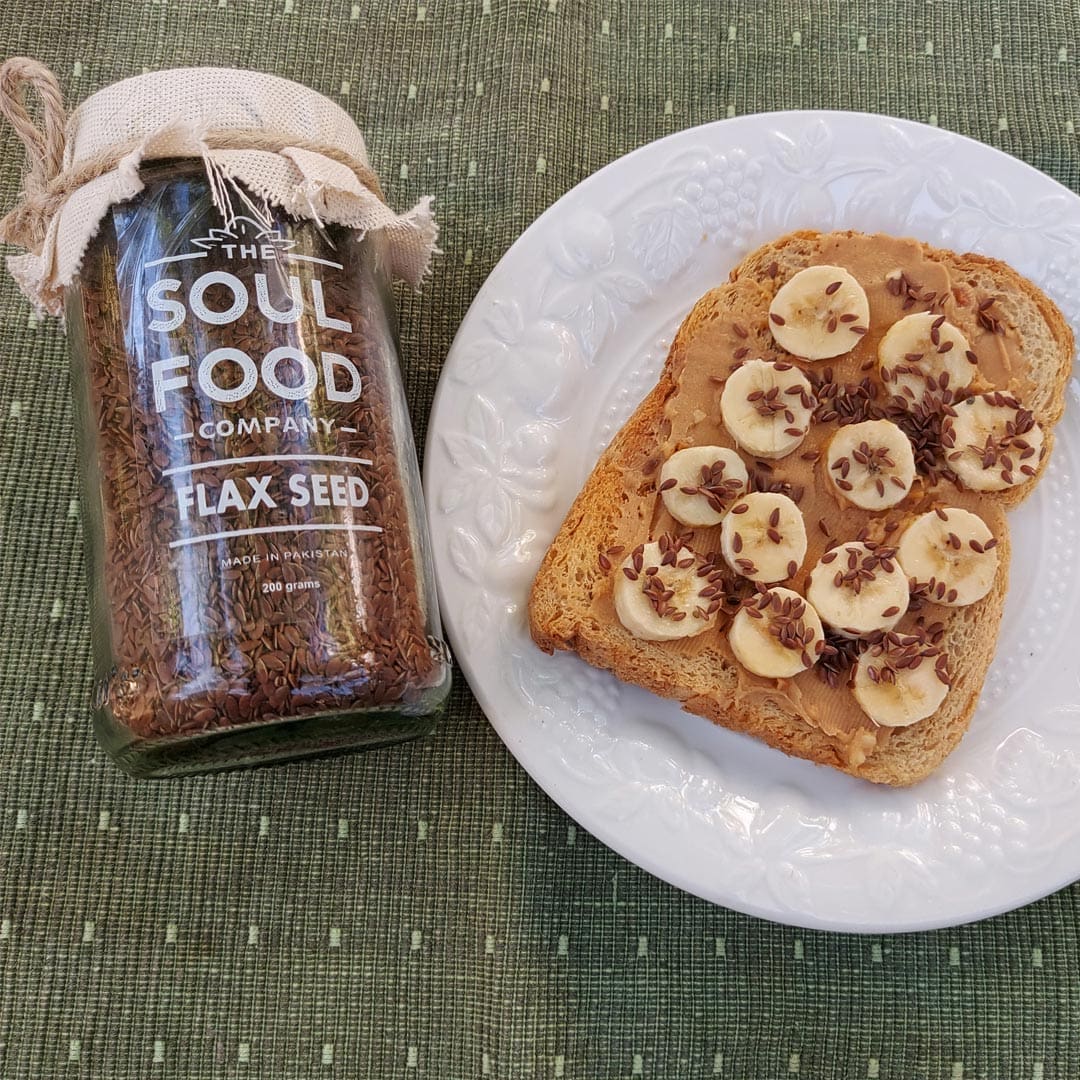

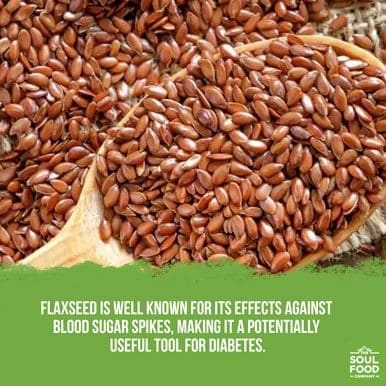
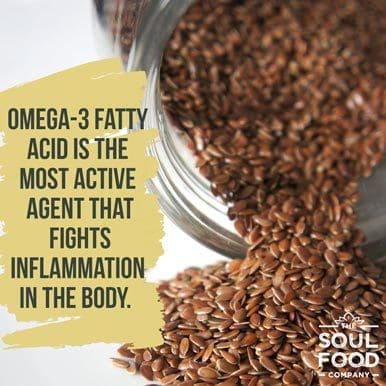



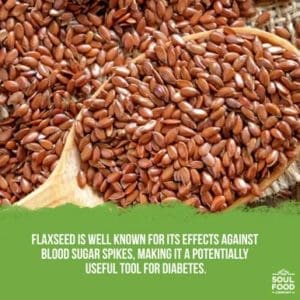


Anonymous (verified owner) –
Saba Naveed (verified owner) –
Maryam (verified owner) –
Fatima Shaukat (verified owner) –
Hijab (verified owner) –
I had issues with the original order which were resolved promptly by the SoulFood Team. Highly rceommended. The quality of the seeds was very good.
Anonymous (verified owner) –
It was a reorder – so it means it was good.
Anonymous (verified owner) –
Mahwish Khan (verified owner) –
Rida (verified owner) –
Great!
Shirin (verified owner) –
Very good quality
Fareeha Malik (verified owner) –
Price seems to be on higher side
Vanita Nazir (verified owner) –
Maryam Fatima (verified owner) –
Anonymous (verified owner) –
Tania Shehryar (verified owner) –
Hassan MaSooD Javaid (verified owner) –
Dr.madiha Shujaat bhutta (verified owner) –
Good quality but over priced
N less quantity
Bilal Haider (verified owner) –
Anonymous (verified owner) –
Shahzaib Arshad (verified owner) –
Anonymous (verified owner) –
Iram (verified owner) –
Very good quality
Aniqa (verified owner) –
The quality is great. Soul Food should also start keeping grounded stock for flaxseed.
Duaa Fatima (verified owner) –
Absolutely pleased with the swift service and great quality product(Flax Seeds) with the incredible packaging. Will shop again 💯
Faryal (verified owner) –
Fresh and good quality products
M. Riasat (verified owner) –
I loved the packing
Anonymous (verified owner) –
Anonymous (verified owner) –
Asma Kamran (verified owner) –
Tehmina Iqbal (verified owner) –
jamshaid ali (verified owner) –
Farheen B. (verified owner) –
Best quality big size seeds, using regular since more than a year .
Afreen Nehal (verified owner) –
Dont know how to review seeds but well the oils are good and pure so these seeds can be ultimately good 😅
shoaib Malik (verified owner) –
thanks the taste was great, just to add if you can slightly fry the seeds it taste even better.
Shahzaib H. (verified owner) –
Anonymous (verified owner) –
Flax seeds can really work, I added them in my diet as a PCOS patient and it works to balance your hormones 🙂
Anonymous (verified owner) –
eesha najam (verified owner) –
Ambreen Z. (verified owner) –
Dr Laila Shahzad (verified owner) –
it was nice and in reasonable market comparative price
Adeel Hughio (verified owner) –
Mumtaz Yousafzai (verified owner) –
Healthy
shanila q. (verified owner) –
excellent quality
Sumaiya Tariq (verified owner) –
Overall good quality
Naveed Rashid (verified owner) –
Very good service and product
heena ghafoor (verified owner) –
loaded with Omega, delicious with oat meal and skimmed milk.
Smirah Banu (verified owner) –
M Awais Qureshi (verified owner) –
Worth the money
Rana A. (verified owner) –
It’s very good
Salwa M. (verified owner) –
Ahmad (verified owner) –
Syed H. (verified owner) –
Loved the quality of seeds…..keep it up ….
Sanam (verified owner) –
Rabbia (verified owner) –
So clean and organic product
Ahmad Tariq (verified owner) –
Mubashirah Fatima (verified owner) –
Kashif Ahmad (verified owner) –
Anonymous (verified owner) –
Amelia Rubin (verified owner) –
I love your products
Umara (verified owner) –
Shahzadi Anwar (verified owner) –
Anoba Amir (verified owner) –
Suriya Nisar (verified owner) –
Good quality
Hena Gilani (verified owner) –
Amrin Niaz (verified owner) –
It was not clean.
Ridda (verified owner) –
Ammara (verified owner) –
effective and pure, thumbs up !
Parkash Adwani (verified owner) –
Risham Pirzada (verified owner) –